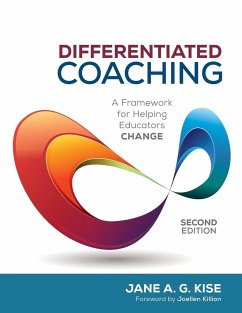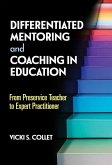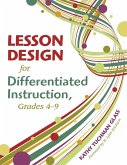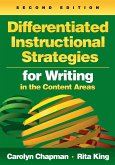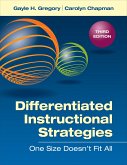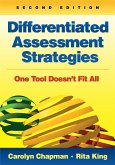- Broschiertes Buch
- Merkliste
- Auf die Merkliste
- Bewerten Bewerten
- Teilen
- Produkt teilen
- Produkterinnerung
- Produkterinnerung
In order for school change efforts to succeed, educators must ensure that changes are being implemented at the classroom level. Jane Kise provides a tested framework for working with teachers to change their classroom practices.
Andere Kunden interessierten sich auch für
![Differentiated Science Inquiry Differentiated Science Inquiry]() Douglas J. LlewellynDifferentiated Science Inquiry40,99 €
Douglas J. LlewellynDifferentiated Science Inquiry40,99 €![Differentiated Mentoring and Coaching in Education Differentiated Mentoring and Coaching in Education]() Vicki S. ColletDifferentiated Mentoring and Coaching in Education44,99 €
Vicki S. ColletDifferentiated Mentoring and Coaching in Education44,99 €![Differentiated Literacy Strategies for English Language Learners, Grades K-6 Differentiated Literacy Strategies for English Language Learners, Grades K-6]() Gayle H. GregoryDifferentiated Literacy Strategies for English Language Learners, Grades K-641,99 €
Gayle H. GregoryDifferentiated Literacy Strategies for English Language Learners, Grades K-641,99 €![Lesson Design for Differentiated Instruction, Grades 4-9 Lesson Design for Differentiated Instruction, Grades 4-9]() Kathy Tuchman GlassLesson Design for Differentiated Instruction, Grades 4-943,99 €
Kathy Tuchman GlassLesson Design for Differentiated Instruction, Grades 4-943,99 €![Differentiated Instructional Strategies for Writing in the Content Areas Differentiated Instructional Strategies for Writing in the Content Areas]() Carolyn ChapmanDifferentiated Instructional Strategies for Writing in the Content Areas39,99 €
Carolyn ChapmanDifferentiated Instructional Strategies for Writing in the Content Areas39,99 €![Differentiated Instructional Strategies Differentiated Instructional Strategies]() Gayle H. GregoryDifferentiated Instructional Strategies30,99 €
Gayle H. GregoryDifferentiated Instructional Strategies30,99 €![Differentiated Assessment Strategies Differentiated Assessment Strategies]() Carolyn M. ChapmanDifferentiated Assessment Strategies42,99 €
Carolyn M. ChapmanDifferentiated Assessment Strategies42,99 €-
-
-
In order for school change efforts to succeed, educators must ensure that changes are being implemented at the classroom level. Jane Kise provides a tested framework for working with teachers to change their classroom practices.
Hinweis: Dieser Artikel kann nur an eine deutsche Lieferadresse ausgeliefert werden.
Hinweis: Dieser Artikel kann nur an eine deutsche Lieferadresse ausgeliefert werden.
Produktdetails
- Produktdetails
- Verlag: SAGE Publications Inc
- 2 Revised edition
- Seitenzahl: 258
- Erscheinungstermin: 7. Juni 2017
- Englisch
- Abmessung: 280mm x 216mm x 14mm
- Gewicht: 684g
- ISBN-13: 9781506327754
- ISBN-10: 1506327753
- Artikelnr.: 47278300
- Herstellerkennzeichnung
- Libri GmbH
- Europaallee 1
- 36244 Bad Hersfeld
- gpsr@libri.de
- Verlag: SAGE Publications Inc
- 2 Revised edition
- Seitenzahl: 258
- Erscheinungstermin: 7. Juni 2017
- Englisch
- Abmessung: 280mm x 216mm x 14mm
- Gewicht: 684g
- ISBN-13: 9781506327754
- ISBN-10: 1506327753
- Artikelnr.: 47278300
- Herstellerkennzeichnung
- Libri GmbH
- Europaallee 1
- 36244 Bad Hersfeld
- gpsr@libri.de
Jane Kise, an educational consultant with extensive experience in leadership, instructional coaching, differentiation, and effective mathematics instruction, is considered a worldwide expert in Jungian type and its impact on leadership and education. The author of over 20 books, she works with schools and businesses, facilitating the creation of environments where everyone-leaders, teachers and students-can flourish. She trains educators around the world on coaching, collaborative practices, effective change processes, and differentiated instruction, especially in mathematics. A frequent conference keynote speaker, her past engagements include education conferences and type conferences across the United States and in Europe, Saudi Arabia, Australia and New Zealand. Jane has also written articles for several magazines and has received awards for her differentiated coaching research. Jane currently teaches doctoral courses in education leadership for the University of St. Thomas and is a past faculty member of the Center for Applications of Psychological Type. She served as President of the Association for Psychological Type International. She holds an MBA from the Carlson School of Management and a doctorate in Education Leadership from the University of St. Thomas. She is certified in Neuroscience and Jungian Personality, is a MBTI ® Master Practitioner qualified to use MBTI Steps I, II and III, and is certified in emotional intelligence instruments and leadership 360 tools. You can read more about her work at www.janekise.com.
Foreword
Acknowledgments
About the Author
Part I: Coaching that is Both Student-Centered and Teacher-Centered
Chapter 1: What Do Teachers Believe?
Chapter 2: Meeting the Needs of the Teacher During Change
Chapter 3: What Problems do Teachers Want to Solve?
Chapter 4: What Evidence Will Inform This Coaching Cycle?
Chapter 5: How Can Teachers Collaborate?
Part II: Developing a Language for Change
Chapter 6: A Common Framework: Creating a Climate where Change is Possible
Chapter 7: Cognitive Processes and Coaching
Chapter 8: Coaching Your Whole Staff for Change
Chapter 9: Professional Development Synergy
A Final Note
Appendices
Appendix A: The Sixteen Types: Strengths, Beliefs and Needs During Change
Appendix B: Problem Solving Model
Appendix C: Polarity Thinking and Differentiated Coaching
References
Index
Acknowledgments
About the Author
Part I: Coaching that is Both Student-Centered and Teacher-Centered
Chapter 1: What Do Teachers Believe?
Chapter 2: Meeting the Needs of the Teacher During Change
Chapter 3: What Problems do Teachers Want to Solve?
Chapter 4: What Evidence Will Inform This Coaching Cycle?
Chapter 5: How Can Teachers Collaborate?
Part II: Developing a Language for Change
Chapter 6: A Common Framework: Creating a Climate where Change is Possible
Chapter 7: Cognitive Processes and Coaching
Chapter 8: Coaching Your Whole Staff for Change
Chapter 9: Professional Development Synergy
A Final Note
Appendices
Appendix A: The Sixteen Types: Strengths, Beliefs and Needs During Change
Appendix B: Problem Solving Model
Appendix C: Polarity Thinking and Differentiated Coaching
References
Index
Foreword
Acknowledgments
About the Author
Part I: Coaching that is Both Student-Centered and Teacher-Centered
Chapter 1: What Do Teachers Believe?
Chapter 2: Meeting the Needs of the Teacher During Change
Chapter 3: What Problems do Teachers Want to Solve?
Chapter 4: What Evidence Will Inform This Coaching Cycle?
Chapter 5: How Can Teachers Collaborate?
Part II: Developing a Language for Change
Chapter 6: A Common Framework: Creating a Climate where Change is Possible
Chapter 7: Cognitive Processes and Coaching
Chapter 8: Coaching Your Whole Staff for Change
Chapter 9: Professional Development Synergy
A Final Note
Appendices
Appendix A: The Sixteen Types: Strengths, Beliefs and Needs During Change
Appendix B: Problem Solving Model
Appendix C: Polarity Thinking and Differentiated Coaching
References
Index
Acknowledgments
About the Author
Part I: Coaching that is Both Student-Centered and Teacher-Centered
Chapter 1: What Do Teachers Believe?
Chapter 2: Meeting the Needs of the Teacher During Change
Chapter 3: What Problems do Teachers Want to Solve?
Chapter 4: What Evidence Will Inform This Coaching Cycle?
Chapter 5: How Can Teachers Collaborate?
Part II: Developing a Language for Change
Chapter 6: A Common Framework: Creating a Climate where Change is Possible
Chapter 7: Cognitive Processes and Coaching
Chapter 8: Coaching Your Whole Staff for Change
Chapter 9: Professional Development Synergy
A Final Note
Appendices
Appendix A: The Sixteen Types: Strengths, Beliefs and Needs During Change
Appendix B: Problem Solving Model
Appendix C: Polarity Thinking and Differentiated Coaching
References
Index

